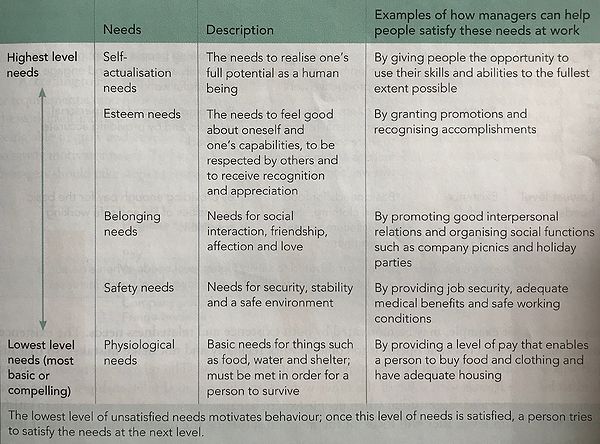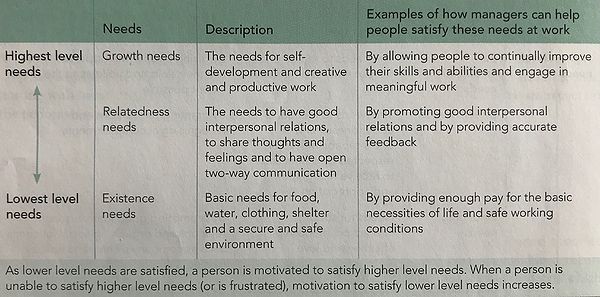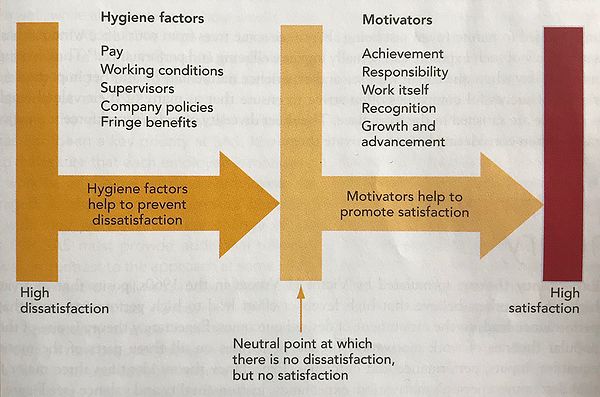Need-Based Theories of Motivation
(→Need Theories) |
|||
| Line 1: | Line 1: | ||
== Abstract == | == Abstract == | ||
| − | |||
== Need Theories == | == Need Theories == | ||
| − | A need is a requirement or necessity for survival and wellbeing. The basic premise of need theories is that people are motivated to obtain outcomes at work that satisfy their needs. There are several need theories, including those that are mentioned below. | + | A need is a requirement or necessity for survival and wellbeing. The basic premise of need theories is that people are motivated to obtain outcomes at work that satisfy their needs. Need theories suggest that to motivate a person to contribute valuable inputs to a job and perform at a high level, a manager must determine what needs the person is trying to satisfy at work and ensure that he og she receives outcomes that help to satisfy those needs in return for performing at a high level and helping the organisation achieve its goals. |
| + | |||
| + | There are several need theories, including those that are mentioned below. | ||
| + | |||
=== Maslow’s Hierarchy of Needs === | === Maslow’s Hierarchy of Needs === | ||
| Line 66: | Line 68: | ||
It is well-known that the human has some needs. As a manager you have to take this in mind to keep the employeers satisfied and motivated. This articel will look at how the different need-based theories has developed and how those challenge each other. In the end the application and limitations are described. | It is well-known that the human has some needs. As a manager you have to take this in mind to keep the employeers satisfied and motivated. This articel will look at how the different need-based theories has developed and how those challenge each other. In the end the application and limitations are described. | ||
| + | |||
| + | To have a motivated workforce, managers must determine which needs employees are trying to satisfy in an organisation. | ||
Revision as of 13:31, 18 February 2018
Contents |
Abstract
Need Theories
A need is a requirement or necessity for survival and wellbeing. The basic premise of need theories is that people are motivated to obtain outcomes at work that satisfy their needs. Need theories suggest that to motivate a person to contribute valuable inputs to a job and perform at a high level, a manager must determine what needs the person is trying to satisfy at work and ensure that he og she receives outcomes that help to satisfy those needs in return for performing at a high level and helping the organisation achieve its goals.
There are several need theories, including those that are mentioned below.
Maslow’s Hierarchy of Needs
It argues that there are five stages of human needs that motivate our behaviour.
Alderfer's ERG Theory
Clayton Alderfer observed that individual needs differ according to circumstances. They do not need to move in an order of progression.
McClelland's Need Theory
Herzberg's Motivation-Hygiene Theory
Comparison
Application
Limitations
Annotated bibliography
XXX
For at få succes med et projekt, er det vigtigt, at man som projektmanager forstår/har for øje, hvordan man motivere sine kollegaer, således at er de er glade og derfor arbejder hårdere mod målet. Der findes forskellige teorier, der beskriver de behov, man som menneske har for at have det godt og derfor være motiverert. I denne artikel beskrives de teorier og hvordan disse udfordrer hinanden. Herudover vil der gås i dybden med, hvilke teknikker man kan bruge for at motivere. Til sidst beskrives de begrænsninger, der mp være ved brug af dette.
It is well-known that the human has some needs. As a manager you have to take this in mind to keep the employeers satisfied and motivated. This articel will look at how the different need-based theories has developed and how those challenge each other. In the end the application and limitations are described.
To have a motivated workforce, managers must determine which needs employees are trying to satisfy in an organisation.



